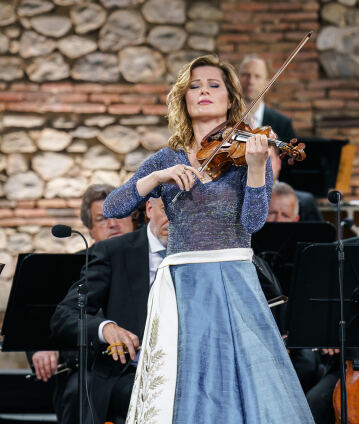2024 Europakonzert with Daniel Harding and Lisa Batiashvili from Tsinandali (Georgia)

Artist in Residence Lisa Batiashvili describes the Europakonzert in her Georgian homeland as the “highlight of my life”. With the Berliner Philharmoniker, a leading European orchestra is making its first guest appearance in the country, which is currently a candidate for EU membership – a powerful statement. Lisa Batiashvili performs Brahms’s Violin Concerto under the baton of Daniel Harding – “with dreamlike technical perfection and depth of feeling that moves the audience to tears” (Frankfurter Allgemeine Sonntagszeitung). Harding then conducts Beethoven’s famous Fifth Symphony.
Given his outstanding song and chamber music output, it is often overlooked that Franz Schubert also had an exceptional dramatic talent and wrote stage works such as the operas Fierabras and Alfonso und Estrella. He also composed music for theatre plays – best known today is his incidental music for Rosamunde, whose overture Schubert originally wrote for another play: Die Zauberharfe. The play takes us into the world of knights and troubadours, which was popular and considered ‘Romantic’ at the time.
Joseph Joachim, the great violinist, composer and conductor, played an important role in the history of the violin concerto in the 19th century. He not only advised Max Bruch and Antonín Dvořák on matters of playing technique, but also Johannes Brahms. Joachim premiered Brahms’s only violin concerto in 1879 under the direction of the composer. The central feature of the work is the equal status of the orchestra and solo part, whose virtuosity is always integrated into the almost symphonic structure. The main theme of the finale reveals the composer’s familiarity with the folk music of Hungary – Joachim’s homeland.
The striking fate motif of Beethoven’s Fifth Symphony has become a recognisable symbol of all classical music. The work also perfectly epitomises the characteristics and innovations of Beethoven’s symphonic music: the minuet customary in Haydn and Mozart is replaced by a scherzo, and the compelling dramaturgy moves unequivocally towards the finale. Beethoven composed the transition from the third to the last movement for this purpose and designed it as a central turning point by changing from C minor to the triumphant C major. The finale’s theme resonates with music from the time of the French Revolution.
© 2024 EuroArts Music International
Categories
Artists
Our recommendations
- 2019 Europakonzert with Daniel Harding from the Musée d’Orsay, Paris
- Daniel Barenboim conducts the 2014 Europakonzert in Berlin
- 2003 Europakonzert from Lisbon with Pierre Boulez and Maria João Pires
- 2023 Europakonzert from Barcelona with Kirill Petrenko
- 2025 Europakonzert from Bari with Riccardo Muti
- 2020 Europakonzert from the Philharmonie Berlin with Kirill Petrenko